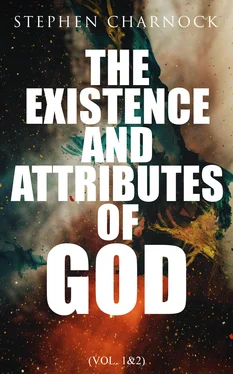Stephen Charnock - The Existence and Attributes of God (Vol. 1&2)
Здесь есть возможность читать онлайн «Stephen Charnock - The Existence and Attributes of God (Vol. 1&2)» — ознакомительный отрывок электронной книги совершенно бесплатно, а после прочтения отрывка купить полную версию. В некоторых случаях можно слушать аудио, скачать через торрент в формате fb2 и присутствует краткое содержание. Жанр: unrecognised, на английском языке. Описание произведения, (предисловие) а так же отзывы посетителей доступны на портале библиотеки ЛибКат.
- Название:The Existence and Attributes of God (Vol. 1&2)
- Автор:
- Жанр:
- Год:неизвестен
- ISBN:нет данных
- Рейтинг книги:3 / 5. Голосов: 1
-
Избранное:Добавить в избранное
- Отзывы:
-
Ваша оценка:
- 60
- 1
- 2
- 3
- 4
- 5
The Existence and Attributes of God (Vol. 1&2): краткое содержание, описание и аннотация
Предлагаем к чтению аннотацию, описание, краткое содержание или предисловие (зависит от того, что написал сам автор книги «The Existence and Attributes of God (Vol. 1&2)»). Если вы не нашли необходимую информацию о книге — напишите в комментариях, мы постараемся отыскать её.
The Existence and Attributes of God (Vol. 1&2) — читать онлайн ознакомительный отрывок
Ниже представлен текст книги, разбитый по страницам. Система сохранения места последней прочитанной страницы, позволяет с удобством читать онлайн бесплатно книгу «The Existence and Attributes of God (Vol. 1&2)», без необходимости каждый раз заново искать на чём Вы остановились. Поставьте закладку, и сможете в любой момент перейти на страницу, на которой закончили чтение.
Интервал:
Закладка:
4. Upon these accounts, therefore, God never testified himself well pleased with that kind of worship. He was not displeased with them, as they were his own institution, and ordained for the representing (though in an obscure manner) the glorious things of the gospel; nor was he offended with those people’s observance of them; for, since he had commanded them, it was their duty to perform them, and their sin to neglect them; but he was displeased with them as they were practised by them, with souls as morally carnal in the practices, as the ceremonies were materially carnal in their substance. It was not their disobedience to observe them; but it was a disobedience, and a contempt of the end of the institution to rest upon them; to be warm in them, and cold in morals; they fed upon the bone and neglected the marrow; pleased themselves with the shell, and sought not for the kernel; they joined not with them the internal worship of God; fear of him, with faith in the promised Seed, which lay veiled under those coverings (Hos. vi. 6); “I desired mercy, and not sacrifice; and the knowledge of God more than burnt‑offerings;” and therefore he seems sometimes weary of his own institutions, and calls them not his own, but their sacrifices, their feasts (Isa. i. 11, 14): they were his by appointment, theirs by abuse; the institution was from his goodness and condescension, therefore his; the corruption of them was from the vice of their nature, therefore theirs. He often blamed them for their carnality in them; showed his dislike of placing all their religion in them; gives the sacrificers, on that account, no better a title than that of the princes of Sodom and Gomorrah; 456and compares the sacrifices themselves to the “cutting off a dog’s neck,” “swine’s blood,” and “the murder of a man.” 457And indeed God never valued them, or expressed any delight in them; he despised the feasts of the wicked (Amos v. 21); and had no esteem for the material offerings of the godly (Psalm l. 13): “Will I eat the flesh of bulls, or drink the blood of goats?” which he speaks to his saints and people, before he comes to reprove the wicked; which he begins (ver. 16), “But to the wicked, God said,” &c. So slightly he esteems them, that he seems to disown them to be any part of his command, when he brought his people out of the land of Egypt (Jer. vii. 21): “I spake not to your fathers, nor commanded them concerning burnt‑offerings and sacrifices.” He did not value and regard them, in comparison with that inward frame which he had required by the moral law; that being given before the law of ceremonies, obliged them, in the first place, to an observance of those precepts. They seemed to be below the nature of God, and could not of themselves please him. None could in reason persuade themselves that the death of a beast was a proportionable offering for the sin of a man, or ever was intended for the expiation of transgression. In the same rank are all our bodily services under the gospel; a loud voice without spirit, bended bulrushes without inward affections, are no more delightful to God, than the sacrifices of animals; it is but a change of one brute for another of a higher species; a mere brute for that part of man which hath an agreement with brutes; such a service is a mere animal service, and not spiritual.
5. And therefore God never intended that sort of worship to be durable, and had often mentioned the change of it for one more spiritual. It was not good or evil in itself; whatsoever goodness it had was solely derived to it by institution, and therefore it was mutable. It had no conformity with the spiritual nature of God who was to be worshipped, nor with the rational nature of man who was to worship; and therefore he often speaks of taking away the new moons, and feasts, and sacrifices, and all the ceremonial worship, as things he took no pleasure in, to have a worship more suited to his excellent nature; but he never speaks of removing the gospel administration, and the worship prescribed there, as being more agreeable to the nature and perfections of God, and displaying them more illustriously to the world. The apostle tells us, it was to be “disannulled because of its weakness;” 458a determinate time was fixed for its duration, till the accomplishment of the truth figured under that pedagogy. 459Some of the modes of that worship being only typical, must naturally expire and be insignificant in their use, upon the finishing of that by the Redeemer, which they did prefigure: and other parts of it, though God suffered them so long, because of the weakness of the worshipper, yet because it became not God to be always worshipped in that manner, he would reject them, and introduce another more spiritual and elevated. “Incense and a pure offering” should be offered everywhere unto his name. 460He often told them he would make a “new covenant by the Messiah,” and the old should be rejected; 461that the “former things should not be remembered, and the things of old no more considered,” when he should do “a new thing in the earth.” 462Even the ark of the covenant, the symbol of his presence, and the glory of the Lord in that nation, should not any more be remembered and visited; 463that the temple and sacrifices should be rejected, and others established; that the order of the Aaronical priesthood should be abolished, and that of Melchizedek set up in the stead of it, in the person of the Messiah, to endure forever; 464that Jerusalem should be changed; a new heaven and earth created; a worship more conformable to heaven, more advantageous to earth. God had proceeded in the removal of some parts of it, before the time of taking down the whole furniture of this house; the pot of manna was lost; Urim and Thummim ceased; the glory of the temple was diminished; and the ignorant people wept at the sight of the one, without raising their faith and hope in the consideration of the other, which was promised to be filled with a spiritual glory. And as soon as ever the gospel was spread in the world, God thundered out his judgments upon that place in which he had fixed all those legal observances; so that the Jews, in the letter and flesh, could never practise the main part of their worship, since they were expelled from that place where it was only to be celebrated. It is one thousand six hundred years since they have been deprived of their altar, which was the foundation of all the Levitical worship, and have wandered in the world without a sacrifice, a prince, or priest, an ephod or teraphim. 465And God fully put an end to it in the command he gave to the apostles, and in them to us, in the presence of Moses and Elias, to hear his Son only (Matt. xvii. 5): “Behold a voice out of the cloud, which said, This is my beloved Son, in whom I am well pleased; hear ye him.” And at the death of our Saviour, testified it to that whole nation and the world, by the rending in twain the veil of the temple. The whole frame of that service, which was carnal, and, by reason of the corruption of man, weakened, is nulled; and a spiritual worship is made known to the world, that we might now serve God in a more spiritual manner, and with more spiritual frames.
Prop. VI. The service and worship the gospel settles is spiritual, and the performance of it more spiritual. Spirituality is the genius of the gospel, as carnality was of the law; the gospel is therefore called spirit; we are abstracted from the employments of sense, and brought nearer to a heavenly state. The Jews had angels’ bread poured upon them; we have angels’ service prescribed to us, the praises of God, communion with God in spirit, through his Son Jesus Christ, and stronger foundations for spiritual affections. It is called a “reasonable service;” 466it is suited to a rational nature, though it finds no friendship from the corruption of reason. It prescribes a service fit for the reasonable faculties of the soul, and advanceth them while it employs them. The word reasonable may be translated “word‑service,” 467as well as reasonable service; an evangelical service, in opposition to a law service. All evangelical service is reasonable, and all truly reasonable service is evangelical.
Читать дальшеИнтервал:
Закладка:
Похожие книги на «The Existence and Attributes of God (Vol. 1&2)»
Представляем Вашему вниманию похожие книги на «The Existence and Attributes of God (Vol. 1&2)» списком для выбора. Мы отобрали схожую по названию и смыслу литературу в надежде предоставить читателям больше вариантов отыскать новые, интересные, ещё непрочитанные произведения.
Обсуждение, отзывы о книге «The Existence and Attributes of God (Vol. 1&2)» и просто собственные мнения читателей. Оставьте ваши комментарии, напишите, что Вы думаете о произведении, его смысле или главных героях. Укажите что конкретно понравилось, а что нет, и почему Вы так считаете.












